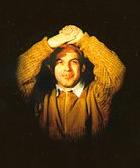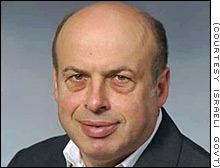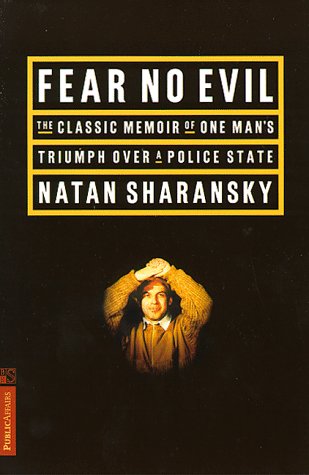

|

|
| 27 September 2005 |
RE: Canadian Human Rights Commission (CHRC) File 20031527, Canadian Jewish Congress v Ukrainian Archive (CJC v UKAR). |
In contrast to the scarcity of evidence that you were ever "Nelson Mandela's lawyer" (as discussed in my letter to you of 19-Sep-2005), or "Andrei Sakharov's lawyer" (as discussed in my letter to you of 25-Sep-2005), the claim that you have been "Natan Sharansky's lawyer" does find some support (as discussed below) � a support, however, that is diminished by two incongruities, and by two instances of inadequate documentation.
One incongruity is that neither of Sharansky's two books acknowledges your participation. The second incongruity is that you never claim to have been Sharansky's lawyer, the claim always being made by third parties.
And burdened with inadequate documentation are (1) the "Cotler Appeal" that you are said to have submitted to Soviet Prosecutor-General Rudenko in August 1978, and (2) the "International Tribunal of Inquiry" before which you are said to have appeared in San Francisco on 23-Jan-1983.
Some Third-Party Claims
Third-party claims that you acted as Natan Sharansky's lawyer are exemplified as follows:
As an international human rights lawyer, Cotler served as counsel to former prisoners of conscience Andrei Sakharov in the Soviet Union, Nelson Mandela in South Africa, Jacobo Timmerman in Latin America, Muchtar Pakpahan in Asia, as well as other well known political prisoners and dissidents. Cotler represented Natan Sharansky, who was imprisoned in the Soviet gulag for Jewish activism. Wikipedia en.wikipedia.org/wiki/Irwin_Cotler |
Cotler, who has defended political prisoners such as Nelson Mandela and Natan Sharansky, suggested it would be prudent to drop the section that defines "terrorist activity" in terms of the perpetrators' motivations. Paul Lungen, Cotler backs anti-terror bill, suggests amendments, Canadian Jewish News, 22-Nov-2001. |
Many saw it as a fitting post for the former human rights lawyer and McGill University constitutional law professor, respected internationally for his work on behalf of people such as Soviet dissidents Anatoly Scharansky and Andrei Sakharov, as well as South Africa's Nelson Mandela. Ian MacLeod, Justice minister leaving his mark despite fractured Parliament, CanWest News Service, 20-Jun-2005 osgoode.yorku.ca/~ |
Cotler represented Natan Sharansky, who was imprisoned in the Soviet gulag for Jewish activism. After his release, Sharansky went on to become Israeli Deputy Prime Minister. It takes a village to repair the world, United Jewish Communities General Assembly (GA Toronto), 13-Nov-2005 www.gatoronto.com/~ |

|
The Prosecutor then asked Shcharansky why, when he sent a telegram of congratulations to the President of the United States on the 200th anniversary of the Declaration of Independence, referring to the great achievements of democracy in the United States, he did not refer at the same time to pornography, the millions of unemployed, prostitution, and so forth. Shcharansky replied that he was "fully aware" of the many negative aspects that exist in Western states, but these facts are reported in Western newspapers, whereas negative conditions in the Soviet Union are never reported in the Soviet press. Martin Gilbert, Shcharansky: Hero of Our Time, MacMillan, London, 1986, pp. 239-240. Reference to "Avital" above is to Natan Sharansky's wife, Avital Sharansky. |
Tirelessly, always hoping that her next effort would be the successful one, Avital Shcharansky travelled the Western world on behalf of her husband, speaking to students, churchmen, community leaders, diplomats and statesmen. As she did so, two French lawyers, Allan Rappaport and Maître Jacoby, as well as Alan Dershowitz and a Canadian attorney, Irwin Cotler, put their legal expertise at her disposal. Martin Gilbert, Shcharansky: Hero of Our Time, MacMillan, London, 1986, p. 281. |
In August 1978 Irwin Cotler prepared for Avital an appeal, addressed to Prosecutor-General Rudenko, setting out, with a vast apparatus of legal knowledge and personal affidavits, the facts of Shcharansky's case. Cotler's appeal concluded that the charge of treason was "clearly as invalid in law as it is unfounded in fact". He also submitted that the charge of anti-Soviet slander and agitation was "unfounded in fact and invalid in law", and that Rudenko, as Prosecutor-General, "should protest the substantial violations of law and procedure, to the end that the judgement be vacated according to law". Martin Gilbert, Shcharansky: Hero of Our Time, MacMillan, London, 1986, pp. 281-282. |
Oh yes, yet another greeting, for Jerry and Jane and their son Michael on his wedding. In general let Natasha pass on my greetings to our many relatives and friends whom she sees nowadays. I often remember many of them for one reason or another. Also don't forget Professor Cotler, who was kind enough to pass on greetings to me from the "Magnificent Seven" of old acquaintances. Of course I send them my reciprocal greetings, gratitude and best wishes. Excerpt from a letter written by Natan Shcharansky, in Martin Gilbert, Shcharansky: Hero of Our Time, MacMillan, London, 1986, p. 318. |
On 23 January 1983, in San Francisco, an International Tribunal of Inquiry was called "to inquire into the imprisonment of Anatoly Shcharansky and his mistreatment by the Soviet Government". The case for Shcharansky was presented by Professor Alan Dershowitz and Professor Irwin Cotler. In its conclusion, the Tribunal found "unimpeachable evidence of Mr Shcharansky's innocence", evidence, it said, "which should be shared with the world". Martin Gilbert, Shcharansky: Hero of Our Time, MacMillan, London, 1986, p. 361. |
Irwin Cotler, The Shcharansky Appeal: Petition to the Procurator-General of the USSR from Avital Shcharansky, on behalf of herself and her husband, Anatoly Shcharansky, by her attorney Professor Irwin Cotler, presented on 30 August 1978. Martin Gilbert, Shcharansky: Hero of Our Time, MacMillan, London, 1986, p. 431. |
 |
Now here we are confronted with a towering incongruity. Where I could find no evidence that you had ever served as Nelson Mandela's lawyer, you seized every opportunity to claim that you had. And where I could find no evidence that you had ever served as Andrei Sakharov's lawyer, you also seized every opportunity to claim that you had. But now that I do find evidence that you did provide some support for Natan Sharansky, I discover you neglecting to take credit.
Why do you take credit where maybe you shouldn't, and fail to take credit where maybe you should? And on top of that why does Natan Sharansky, following the example of Nelson Mandela and Andrei Sakharov, fail to acknowledge you in his books?
In an attempt to resolve this puzzle, I reviewed the Martin Gilbert statements quoted above.
Reviewing the Martin Gilbert Testimony.
Of the five topics dealt with by Martin Gilbert, three are insubstantial, and do not, either singly or together, come close to qualifying you as having served as Natan Sharansky's lawyer.
Pages 229-230 has you summarizing for Canadians an argument that Sharansky had presented to a Soviet court. The argument is effective, and your paraphrasing it for Canadians is supportive of Sharansky, but your role is closer to that of a reporter than of Sharansky's lawyer.
Page 281 has you mentioned in fourth place among four lawyers who placed their legal expertise at the disposal of Natan Sharansky's wife, Avital. But offering your services to the wife is not the same as delivering them to the husband. This too falls short of making you Natan Sharansky's lawyer.
Page 318 has Natan Sharansky acknowledging that you passed greetings along to him, and shows him returning those greetings, but perhaps somewhat perfunctorily. Sharansky does not say that the "gratitude" he expresses is for your legal services; it could have been for as little as your expression of sympathy or your moral support or your admiration of his courage. Everyone must be convinced that the two of you were acquainted, but the evidence that you acted as his lawyer has yet to appear.
The two Martin Gilbert topics that remain offer the greatest potential for corroborating your claim to have acted as Natan Sharansky's lawyer.
Pages 281-282 and 431 allude to an "appeal" (referred to below as the "Cotler Appeal"), but do not say whether it was written in English or Russian, or how a Canadian lawyer working in Canada could have been able to cite Soviet law or precedent, or whether this Cotler Appeal was properly submitted, and filed by the Soviet court, or ignored by the court as a mere informal letter from somebody who had not taken the trouble to obtain standing or to get his submission filed, and which informal letter the court was obligated to ignore just as it was obligated to ignore any ex parte letter that it might receive which attempted to influence a judicial decision. It may even be wondered whether your letter reached the court at all, as it seems to have been mailed only to the prosecutor, Rudenko, whom nothing prevented from filing it in his trash can. It may be questioned why your letter was not sent instead to Sharansky's Soviet defense lawyers, who � had they found your letter helpful � would have known how to submit it to the court so as to make it part of the trial record.
Answering the above questions, and publishing a copy of this Cotler Appeal, would be indispensible steps toward clarifying whether it constitutes the occasion on which you may be said to have acted as Natan Sharansky's lawyer.
Page 361 has Alan Dershowitz and yourself appearing before an "International Tribunal of Inquiry" in San Francisco on 23-Jan-1983. However, when I searched the microfilm of the New York Times and the Globe and Mail over the dates Saturday 22-Jan-1983 through Tuesday 25-Jan-1983, I was unable to find any reference to such an "International Tribunal," which surprised me, as I imagined that it would be of interest to the press, especially since among its participants was one of America's most famous lawyers � Alan Dershowitz � and especially since its purpose was to contribute toward the emancipation of one of the world's most famous political prisoners � Natan Sharansky. And even if the press happened not to attend the hearings of the "International Tribunal," I would have expected them to at least summarize the press releases which the "International Tribunal" might be expected to have issued.
For the purpose of lending credibility to this "International Tribunal," would you be able to disclose what body authorized it � as perhaps the United Nations, the World Court, the United States Government, the State of California, the City of San Francisco � or perhaps no authorization from any body? And in what San Francisco building did this "International Tribunal" convene, and over what interval of time, and on what dates? And who were the judges who sat on this "International Tribunal"? And what lawyers represented the Soviet viewpoint? And what witnesses testified, and what documents were consulted? And if this "International Tribunal" concluded that its evidence "should be shared with the world," then where are the newspaper reports indicating that the evidence had been so shared, and where a transcript of its proceedings, and where a copy of its final report? The fundamental question that needs to be addressed is the degree to which this "International Tribunal of Inquiry" amounts to more than a Dershowitz-Cotler publicity stunt.
Until the above issues are resolved and the requested material disclosed, Martin Gilbert's reference to your appearance before an "International Tribunal of Inquiry" will fall short of establishing that it was the occasion on which you may be said to have acted as Natan Sharansky's lawyer.
Your Wikipedia biography begins the listing of your international clients with the words "As an international human rights lawyer, Cotler served as counsel to...." However, delving into the nature of the project of which Natan Sharansky's release was one goal leads to the question of whether "human rights" played any role. For example, Martin Gilbert's Appendix 1 lists "Prisoners of Zion on 12 February 1986." His Appendix 2 lists "Former Prisoners of Zion Still Refused Exit Visas as of 12 February 1986." His Appendix 3 tabulates Jewish emigration:
|
Appendix 3 Annual Emigration of Soviet Jews, 1951 to 1985 |
||||
| 1951 | 186 | 1969 | 3,011 | |
| 1952 | 56 | 1970 | 1,044 | |
| 1953 | 39 | 1971 | 13,033 | |
| 1954 | 26 | 1972 | 31,681 | |
| 1955 | 123 | 1973 | 34,733 | |
| 1956 | 460 | 1974 | 20,767 | |
| 1957 | 1,314 | 1975 | 13,363 | |
| 1958 | 720 | 1976 | 14,261 | |
| 1959 | 1,353 | 1977 | 16,737 | |
| 1960 | 1,917 | 1978 | 28,864 | |
| 1961 | 216 | 1979 | 51,320 | |
| 1962 | 184 | 1980 | 21,471 | |
| 1963 | 304 | 1981 | 9,475 | |
| 1964 | 530 | 1982 | 2,638 | |
| 1965 | 887 | 1983 | 1,314 | |
| 1966 | 2,027 | 1984 | 896 | |
| 1967 | 1,416 | 1985 | 1,140 | |
| 1968 | 230 | |||
When the emigration of Soviet Jews was permitted by Moscow, they began pouring into Israel in large numbers, particularly after the doors to the United States became closed to them. Jealous of the attention and advantages given these new arrivals from Europe who, they were quick to point out, had come only as a matter of second choice, the Ethiopian Jews referred to themselves as the "forgotten immigrants." (The Israeli Arabs, predictably, resented both of these groups of newcomers.) Alfred M. Lilienthal, The Grand Illusion of Jewish Ethnicity, Middle East Policy, Volume 1, Issue 3, 1992, p. 107. |